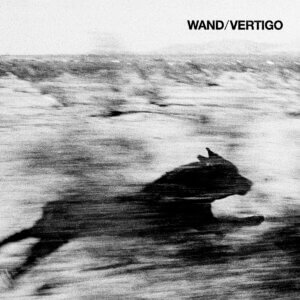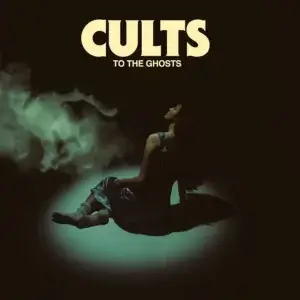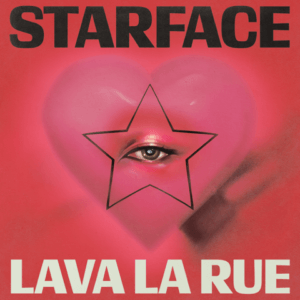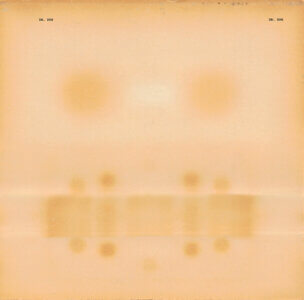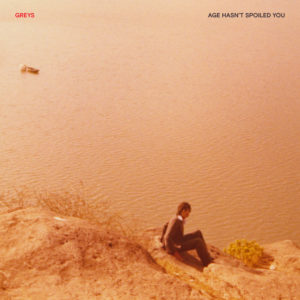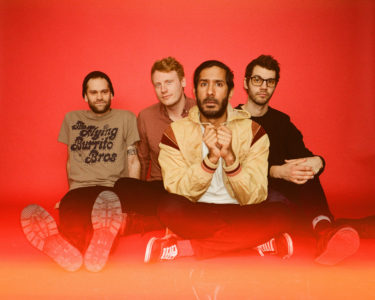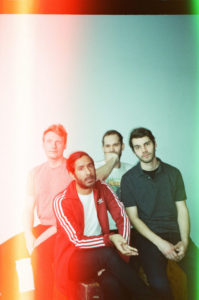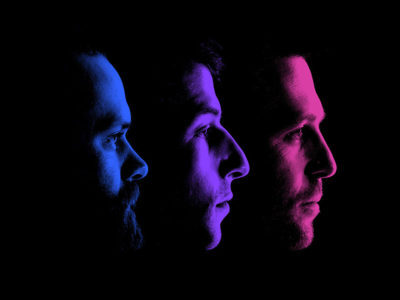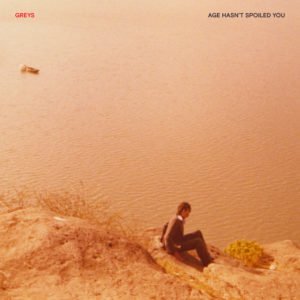Interview with Greys’ Shehzaad Jiwani

The irony has probably become a cliché by now, but guys that play in the loud bands are more often than not the most relaxed and affable dudes you’ll ever meet. In this case, Greys are no exception. Their first full length release, If Anything, was a total sonic assault borne of anxiety and frustration and carried with it a lot of comparisons to bands like Nirvana and Fugazi. Following up with the EP, Repulsion, Greys have been able to show listeners that they’re not simply a band that apes their influences. Their upcoming second album, Outer Heaven, is due out April 22 and is sure to turn a couple ears. A step away from their grungier sounds and toward their dissonant and experimental ones, the band is showing signs of maturation. Their recent single “No Star”, written in the wake of the Paris attacks and the following wave of xenophobia even shows a political depth to the band that wasn’t necessarily ever missing. Recorded in Montreal at the fabled Hotel2Tango studios, Greys put Outer Heaven together through a long “burst of creativity”. It’s a step away from If Anything, but undeniably a step forward. Shehzaad Jiwani, singer and guitarist, is relaxed over the phone as he talks about bands like Unwound and Swell Maps, developing the band’s sound, and how to deal with long rides in a van.
Northern Transmissions: Great to talk to you. You guys finished a few American Dates. How was SXSW? I saw Colin [Gillespie, bass] sprained his ankle.
Shehzaad Jiwani: Yeah, we played a show and the Last show we played on the Saturday he got a little overzealous, and I guess sprained his ankle, he rolled it while and onstage and he kept playing the show. I didn’t even realize until afterwards that he’d sprained his ankle.
NT: I’ve seen you guys live, he definitely has the the biggest presence on stage.
SJ: [laughs] …And he’s a big guy so, yeah.
NT: So you guys have done a lot of touring I wanna know, what’s the best way to pass time while you’re in a van on tour?
SJ: Oh God, we listen to a lot of podcasts, some are better than others. We get really goofy, we get really giggly as a band. We’ll just find one thing really funny and we’ll laugh about it for a straight hour but the hour immediately after that we just don’t say anything to each other for another hour and then we see another thing that’s funny and we laugh at that so that’s like, that’s pretty much the ebb and flow of our band. I don’t know, I play Finally Fantasy 7 on my phone cause I’m an idiot and for some reason decided to play that game again because I haven’t played it since I was 10. What else do we do? We ask each other a lot of questions like: “So would you rather take drink a cup of fuckin’ human hair, or do a shot of toe nails?” We ask a lot of questions like that, so that’s us. We’re losers.
NT: I’ve seen you guys live a couple times before but I never actually dug into the record. I’ve been listening to If Anything for the past couple days and I can say I’m really excited for Outer Heaven. You said If Anything was the first statement of a fully realized band. Would you say this is the second statement? Or was that more Repulsion, the last EP?
SJ: In retrospect, If Anything was the first step forward. It was the culmination of all of our influences up to that point, but the first step towards what we wanted to turn those into and add our own voice to and become our own band. Repulsion was sort of like, the next step to that. It was realizing, ok well now we’ve established who we are, and we know people know where we come from and people know where we want to go, so which direction do we need to go in, so Repulsion was sort of a first step for that, of us kind of realizing where we wanted to go. By that I mean, you know, we wanted to go into every direction. So we wrote a krautrock song, and we wrote a really slow, sludgy song, and the noise itself was part of the melody. So it opened a lot of doors creatively whereas If Anything kind of closed them. It kind of opened up a lot of avenues for us to explore. Outer Heaven kind of doubled down on that. We’ve never gone in one direction. We’ve always kind of gone in every direction and tried to make it work, so I think it definitely does that. All the songs have their own vibe. I don’t think any of them sound the same, but I can’t think it sounds like anything other than Greys.
NT: So hopefully a lot less Nirvana and Fugazi comparisons off this record.
SJ: [laughs] Yeah I mean.. I don’t… I guess I get it. But I always found it really funny because people would say like: “Oh they sound like Nirvana and Fugazi” as if both of those bands are comparable in any way. Those bands could not be more diametrically opposed. So a mix of those two bands is kind of inherently it’s own thing I guess. Which is definitely where we come from but there’s definitely none of that on this record.
NT: I saw Sloan and Pavement were influences for the newer record. You’ve also said “I’d Hate to Be an Actor” has a sort of Kinks vibe to it. Is this a more melodic record?
SJ: It’s definitely a lot more melodic. There’s definitely some shouting on it, like, it gets intense, but I just felt like singing a lot more. I didn’t really have an interest in doing kind of bark-y stuff. Even on If Anything, even the heavier tracks have melody. We’ve always tried to reconcile the dissonance with the melody in that way. This is way more in that direction. If the melody comes from the guitars then I’m gonna be yelling and vice versa. If there’s feedback and noise I’ll try to sing over it because it’s kind of a weird challenge to me. Swell Maps and Portishead kind of do that noisy thing pretty easily, and interestingly, and I kinda wanted to do something like that.
NT: You recorded at Hotel2Tango which has a big reputation on it’s own. What made you guys decide to go to Montreal?
SJ: It’s kinda weird, I don’t have a personal relationship with any of the records that came out of that studio, I just really like the way they sound. It’s actually kind of funny, our friends in the Wooden Sky recorded a couple records there and that’s how we initially got introduced to the studio and Howard [Bilerman] and Radwan [Moumneh]. So we had talked to them as far back as 2012 but we had never had the time or the money to do it. We just wanted to get out of our comfort zone. So with Repulsion we actively tried to do that. We really loved it over there, we just fell in love with the space. Howard was so wonderful to work with. On this one he actually didn’t engineer it, it was our guy Mike Roscha who we’ve done pretty much everything with, and a guy name Greg Smith who engineered it. It was great, we just really liked it.
Being in a place where you are just solely there to make music, makes it really interesting and really kind of intense burst of creative it because being creative is your job. It’s fuckin’ cool, a couple of songs on the record were basically written in the apartment we stayed at, and the night after we’d finish it in the studio. I would go home, play some shit on guitar, the guys would be making dinner, and Mike would come in the room and say: “That’s cool, try something like this” and we would basically put the song together like, there, while we were eating dinner. The guys literally went out to do groceries and I was like: “Yeah, I finished the song”.
There’s a song called “Blown Out”, and on the record and at the end of it you hear me and Braeden (our drummer) going “that was so great!” That was literally the first time we ever played that song. The last song on the record wasn’t even written before we went into the studio. It all kinda came together right there. We just kinda put it together. There’s a drum machine on it, for most of the song neither of us are playing at the same time, it’s just like, one of us experimenting and the other just kinda picks it up. It’s crazy it’s not a total trainwreck.
NT: With the writing the record, there’s a move outward. Especially on a song like “No Star”. What exactly is drive to move your focus out from in? Was there a decision to get out of your head and start writing about the world around you?
SJ: I don’t think it’s so much a decision. If I wanna write about something it’s usually because it annoys me, and the first thing that annoys me that day is what I’m gonna write about. That happened to be written immediately after a really terrible thing that happened in the wake of a lot of people saying and doing insane things. So that was just where my head was at and I just happened to be… It wasn’t a conscious decision to not write about myself. I don’t know, that’s just what was on my mind that day. Pretty much right before I go to the studio I’ll think of something and go with it. It’s always through the prism of my own experience and my own personality. I just tried to make it more outwardly focused for no particular reason. I mean, you kinda have to. If you’re a band in 2016 that doesn’t pay attention to the world around you, then stop wasting everybody’s fuckin’ time.
NT: I feel like there is a certain level of you in that song at least you’ve talked about growing up as a person of colour in a predominantly white community and being a little confused about where your identity lies. Is that your story growing up?
SJ: Yeah, kind of. It’s something I only became acutely aware of like, later on in my life, like in the last couple years. It’s not like a pleasant thing to realize that you’re like, different from other people and it’s something that I kinda chose not to address a lot when I was younger but I realized that it’s not gonna be our generation that doesn’t have to address it. It’s gonna be further generations down the line. So I owned up to it a little bit.
NT: You’ve done a fair amount of producing for bands like the Beverlys and the Dirty Nil. I have to say the Nil stuff sounds incredibly heavy, so congrats on that. What’s your ethos as a producer? What do you try to bring to a studio when you’re working with a band?
SJ: I think it’s too early to tell. I’ve only done a few. I don’t think I have one yet, I mean, I’m lucky enough to work with Josh Korody a lot. I don’t know if I have a personal thing that I bring to it. I kinda follow his lead a lot. For me its’ just about songs. The bands that I like to work with, they’re my friends, but if you don’t have songs then it’s not very interesting. If you’re just doing one sound then I don’t know if I could add to that very much. This sounds really dorky but just hooks and melodies are really interesting to me and applying that to a noisy punk band is extra interesting to me because I like that juxtaposition a lot.
NT: Well you guys also started out as a more straight-forward punk band. When did you decide that you wanted to be dissonant or noisy?
SJ: Well didn’t want to be a hardcore band. Ever. It was more interesting for me to make actually noise than play a guitar like it’s supposed to be played and play chords and stuff like that. it’s way more challenging to be like, elemental and mercurial that way. Guitar players like Andy Gill, Carrie Brownstein, so many different people like Justin Trosper from Unwound, these people are creating so much noise but it’s so melodic and so weird and formless but it’s still like the driving force behind the music. Like a band like Neu!, I mean the way they play guitar is so insane. How would you ever arrive to that conclusion? And of course Sonic youth. Things like that became way more interesting to me than a hardcore band could be. I thought we were always gonna play that way, we just had to learn how to do it. Even on our earliest shit there’s still a lot of noise, we just didn’t really know how to put form to it. We’re just always figuring out how to do it.
NT: Really great to talk to you man, good luck on the new record.
SJ: Sure. Thanks so much for calling!
interview by Graham Caldwell
Latest Reviews
Tracks
Advertisement
Looking for something new to listen to?
Sign up to our all-new newsletter for top-notch reviews, news, videos and playlists.

